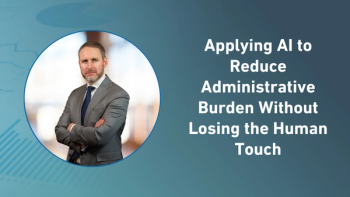
- Applied Clinical Trials-12-01-2024
- Volume 33
- Issue 12
Popular Culture and Clinical Research Literacy
Collective investment into leveraging popular culture and mass media as an educational medium is urgently needed.
A study conducted nearly 20 years ago by the Center for Information and Study on Clinical Research Participation (CISCRP) shed light on the growing role that mass media and popular culture play in providing clinical research exposure and education to the public and those living with disease. In an open-ended question, the 2007 survey asked US-based patients and the public to name a single living scientist involved with medical research. The top three individuals named—in order of frequency—were Sanjay Gupta, chief medical correspondent for CNN; C. Everett Koop, former US surgeon general and a highly public figure during the HIV/AIDS crisis; and a distant third, Harold Varmus, Nobel Laureate and former head of the National Institutes of Health (NIH).
Insight from this critical finding helps explain why public and patient clinical research literacy and trust has not changed meaningfully during the past two decades despite widespread coverage and visibility of medical innovation throughout and following the COVID-19 pandemic.
The clinical research enterprise has largely failed to leverage popular culture and mass media as an educational medium. Collective investment in this channel is urgently needed, particularly in light of high and growing difficulty enrolling study volunteers and the expected challenges influencing public clinical research literacy in the future.
Connection, relevance, and trust
Public and patient connection and trust in the clinical research enterprise is essential to the very viability of that enterprise. Recognition of the personal value and relevance of clinical research is manifest in a variety of ways, including consumer support for products and practices that have been evaluated and approved following clinical research testing and regulatory review; public support and appreciation for the volunteers and professionals involved in clinical testing and approval of new medical interventions; policymaker and political support for reforms and incentives that enable the clinical research enterprise to perform effectively and efficiently; and patient willingness to make the courageous decision to participate in clinical trials.
Public and patient attitudes have not changed—or have worsened—despite remarkable medical achievements accompanied by broad-reaching media attention. Global surveys conducted by CISCRP during the past 10 years among more than 8,000 people who have never participated in clinical trials consistently show the same high level of general support and willingness to participate and low levels of trust and confidence.
In the 2013 Perceptions and Insights Study, the vast majority (94%) of respondents reported understanding the terms clinical research study and clinical trial “somewhat” or “very well.” This compares to a similar 91% of respondents in 2023. And in the earlier 2013 study, 95% of respondents indicated their willingness to participate in a trial compared to 87% of respondents in 2023.
Public and patient trust in the professionals who oversee, manage, and fund clinical trials has not changed or has eroded somewhat. The 2017 CISCRP Perceptions and Insights study found that 33% of respondents trust the pharma industry to be transparent and accurate in communicating about clinical trials. That percentage only modestly increased to 35% in the most recent 2023 CISCRP study. Public polls conducted by Harris Interactive and Statista show that trust in the FDA has fallen. A 2007 Harris Interactive poll among 1,726 US adults found that 27% of the public distrusts the FDA “somewhat” or “very strongly.” A 2024 Statista survey among 1,063 US adults found that 37% of the public distrusts the FDA.
Failure to educate
Many factors contribute to our inability to improve public trust and confidence in clinical research. During the past decade, the clinical research enterprise has endured public skepticism and criticism of industry practices deemed questionable and deceptive. Fueled by social media, much has also been expressed about the failure of regulatory agencies and clinical research professionals to act ethically and equitably and to protect the safety of study volunteers and the public.
Empirical research conducted by the Tufts Center for the Study of Drug Development (Tufts CSDD) shows that since 2003, high and rising investment of capital and personnel committed to patient recruitment and retention is associated with the worsening of global investigative site activation and study enrollment rates. Past columns in Applied Clinical Trials have characterized the extremely complex protocol designs and ever-more-narrowly-defined patient populations that are contributing to this troubling and frustrating reality. Public distrust and miseducation is also playing a part and the clinical research enterprise has been ineffective in addressing this fundamental condition.
Clinical research sponsors and their collaborators primarily interact with the media in a transactional way when they are initiating a clinical trial, seeking to reach and randomize study volunteers, or when announcing a medical advancement. The media and popular culture take an entirely different tact focusing instead on highly memorable and sensationalistic accounts of human error, concealment, fraud, and corruption. Popular culture engages its biggest Hollywood stars to promote these messages.
Sponsors (and investigative sites) rarely, if ever, respond to media coverage, as they are usually instructed not to interact with journalists for fear of bringing more attention to and legitimizing a story, or of appearing defensive and self-serving.Although a few documentary films have been produced and aired more widely of late (e.g., First in Human, a 2017 film by the NIH), it has been hard to attract viewers and divert attention from Hollywood. The clinical research enterprise has not yet made the investment in popular culture to effectively increase clinical research literacy.
In rare instances when clinical research is depicted in novels and film, it is nearly always portrayed as dark and sinister. In John Le Carre’s best-selling book The Constant Gardner—made into a major motion picture in 2005 starring Ralph Fiennes and Rachel Weisz—a healthcare activist is murdered before she is able to expose a large pharmaceutical company that has been exploiting vulnerable African study subjects. And in the widely streamed film The Fugitive, Harrison Ford plays a physician wrongly accused of the murder of his wife. Ford is able to exonerate himself when he proves that the murder was part of a cover-up by a colleague who had been falsifying clinical research data to support a drug for a company in which he was a major shareholder. More recent films produced and distributed by online streaming services—whose titles reveal their storylines—include The Lazarus Effect (2015) starring Olivia Wilde and Donald Glover, and Maniac (2018) starring Jonah Hill and Emma Stone.
Leveraging popular culture
Patient enrollment challenges, predominance of social media as the preferred communication and education medium, and an expected combative and confusing environment for health policy and medical innovation during the next four years speaks to the urgent need to dramatically change the way that the clinical research enterprise elevates clinical research literacy. The public prefers entertainment and short, real-time messaging as their primary sources for clinical research education. The industry must respond accordingly.
“Edutainment”—education that occurs during a captivating and entertaining experience—is an essential approach that must be collectively embraced and supported at this time. Entertaining public service announcements and movies, with marquee actors, will help counter the effects of the typical, unoriginal sensationalistic stories.
There are several key objectives for edutainment-based clinical research literacy initiatives: (1) establishing the personal relevance of clinical research and why it may be an important consideration during one’s own healthcare journey; (2) showing that clinical research participation is not an activity reserved only for the most seriously ill, but rather for many individuals who are able to incorporate it into their daily life; and (3) conveying the compassion, care, and professionalism that the research community brings in its efforts to partner and engage with patients and their families.
The
CISCRP—and other organizations—have also been exploring films and miniseries that move clinical research to the background of a storyline where the protagonist is participating in a clinical trial while an unrelated plot unfolds. These forms of edutainment, particularly when top talent is involved, requires substantial investment.
We will continue to see clinical research literacy and trust languish if we fail to meet the public where they are learning about clinical research.
Ken Getz, MBA, Executive Director and Research Professor, Tufts Center for the Study of Drug Development, Tufts University School of Medicine
Articles in this issue
about 1 year ago
Applied Clinical Trials December 2024 Issue (PDF)about 1 year ago
The Year of AIabout 1 year ago
Enhancing eCOA Through AI: A Look Ahead to 2025about 1 year ago
Applied AI and Advanced Automation in Clinical Trialsabout 1 year ago
Leveraging AI/Machine Learning as an End-to-End Differentiatorabout 1 year ago
In Focus: AI and Clinical Trials — ‘The Beginning of a Journey’about 1 year ago
Accelerating Breakthroughs with Synthetic Clinical Trial Dataabout 1 year ago
Why Mindset Matters in Clinical ResearchNewsletter
Stay current in clinical research with Applied Clinical Trials, providing expert insights, regulatory updates, and practical strategies for successful clinical trial design and execution.




